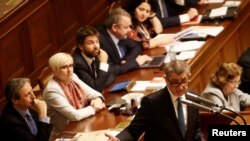The cabinet of Czech Prime Minister Andrej Babis resigned on Wednesday, a day after losing a confidence vote on the billionaire politician's first attempt
to form a government while battling fraud allegations.
Babis's ANO party won a national election last October but holds only 78 of 200 seats in the lower house and has thus far been unable to persuade any of the eight other parliamentary parties to join a coalition because of the allegations, which concern EU subsidies.
The government will stay in office until a new cabinet is put in place, which could take months. President Milos Zeman has promised Babis a second try to form a government and has said he would allow sufficient time for negotiations.
Zeman's spokesman said no date had been set for when the president would accept the resignation. He said earlier information that it would be by the end of the week was no longer valid.
With the economy powering ahead and wages rising as unemployment hovers around two-decade lows, markets have brushed off the political uncertainty. The crown jumped to the highest level since March 2013 on Wednesday afternoon.
Much of the electorate also appears unconcerned, and support for ANO has grown despite the subsidy scandal. A CVVM institute poll in December showed the party at 35.5 percent compared to the 29.6 percent it won in October.
This has made other parties wary of forcing a new election and several have declared they were open to negotiation.
However, the prime minister's role remains a sticking point. Police allege Babis, the country's second-richest person, hid ownership of one of his companies a decade ago to win a 2 million euro subsidy, mostly from European Union funds, meant for small businesses. He denies wrongdoing.
Parliament's second-biggest party, the conservative Civic Democrats, has made Babis stepping aside a condition for talks.
The Social Democrats and Christian Democrats — ANO's former ruling partners — are open to talks but say they will not join a government with a prime minister facing a police investigation.
The far-right SPD party and far-left Communists have signaled willingness to work with ANO, but Babis does not want a government with them.
Babis: In or out?
Babis was charged in the case but regained immunity from prosecution when he was re-elected to parliament. Lawmakers will vote on Friday whether to lift that immunity and are expected to do so.
Babis, who calls the subsidy case a ploy by adversaries to chase him out of politics, said on Tuesday he would request it be lifted.
In past months, Babis has repeatedly ruled out mirroring the arrangement in Poland whereby the head of the ruling PiS party, Jaroslaw Kaczynski, is considered de-facto leader despite holding no formal position in government.
But Babis shifted slightly this week when asked by reporters on whether he could rule out a government without him, saying everything would depend on the upcoming negotiations.
Babis founded ANO in 2011 after building an empire in food, agriculture, chemicals and media valued at $4 billion. After support for the party surged in a national election in 2013, it joined a government led by the Social Democrats.
ANO won the October election with promises to fight political corruption, bring a businessman's sense to government and raise the country's profile within the EU. It has also said it will boost spending on crumbling roads, digitalize government and cut taxes.
The vote brought gains for protest parties at mainstream parties' expense, tracking a trend that has spread across Europe, often complicating coalition-building as in Germany.
The possible departure of Zeman as president is further muddying Czech political waters. His bid for re-election is facing a formidable challenge from academic Jiri Drahos in a run-off ballot on Jan. 26-27.
Drahos has said it would be unacceptable for someone charged with a criminal offense to be prime minister.
Reporting by Robert Muller and Jason Hovet; Editing by Jan Lopatka and John Stonestreet.





